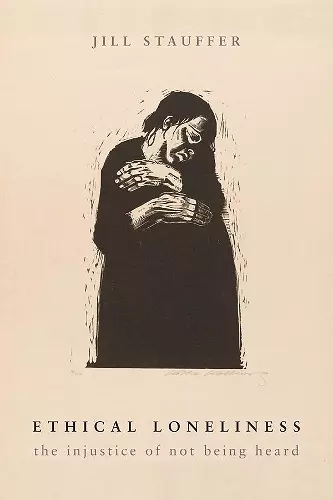Ethical Loneliness
The Injustice of Not Being Heard
Format:Hardback
Publisher:Columbia University Press
Published:25th Sep '15
Should be back in stock very soon

Stauffer examines difficult truths about the desire and potential for political forgiveness, transitional justice, and political reconciliation. Moving beyond a singular focus on truth commissions and legal trials, she considers more closely what is lost in the wake of oppression and violence, how selves and worlds are built and demolished, and who is responsible for re-creating lives after they are destroyed.
Ethical loneliness is the experience of being abandoned by humanity, compounded by the cruelty of wrongs not being acknowledged. Jill Stauffer examines the root causes of ethical loneliness and difficult truths about the desire and potential for political forgiveness, transitional justice, and political reconciliation.Ethical loneliness is the experience of being abandoned by humanity, compounded by the cruelty of wrongs not being heard. It is the result of multiple lapses on the part of human beings and political institutions that, in failing to listen well to survivors, deny them redress by negating their testimony and thwarting their claims for justice. Jill Stauffer examines the root causes of ethical loneliness and how those in power revise history to serve their own ends rather than the needs of the abandoned. Out of this discussion, difficult truths about the desire and potential for political forgiveness, transitional justice, and political reconciliation emerge. Moving beyond a singular focus on truth commissions and legal trials, she considers more closely what is lost in the wake of oppression and violence, how selves and worlds are built and demolished, and who is responsible for re-creating lives after they are destroyed. Stauffer boldly argues that rebuilding worlds and just institutions after violence is a broad obligation and that those who care about justice must first confront their own assumptions about autonomy, liberty, and responsibility before an effective response to violence can take place. In building her claims, Stauffer draws on the work of Emmanuel Levinas, Jean Amery, Eve Sedgwick, and Friedrich Nietzsche, as well as concrete cases of justice and injustice across the world.
A timely book-rarely has the fecundity of the Continental approach to ethics been so clearly and persuasively on display. -- Robert Bernasconi, Penn State University To read Ethical Loneliness is to undergo the page-turning yet profoundly uncomfortable experience of struggling to hear the fractured stories told by survivors. Jill Stauffer's voice leads us carefully and thoughtfully through an unsettling hell of testimonies, showing us how difficult it is for us to linger in the discomfort of hearing about violent injustice without rushing through the ugly parts, forgetting the hard parts, dismissing the odd parts, straightening out the chronology, watering down the anger, denying the complicity, enforcing forgiveness or victimhood, whitewashing the ending, and missing what is not said and what cannot be put into words. This book, or rather, this experience of listening, is destined to become, like Elaine Scarry's The Body in Pain, a classic text in the field. It is really that good. -- Linda Meyer, Quinnipiac University Stauffer's book breaks through legalistic approaches to mass violence and oppression to uncover the conditions of the repair of lives and worlds in human interdependence. Her bold claims for widely diffused reparative responsibilities are built on close discussions of how together we author-or destroy-selves and worlds. Her impressive blending of contemporary events and philosophical reflection reveals the wide scope of responsibility that implicates us in the repair of others' suffering in ways we are usually glad to ignore or resist. -- Margaret Urban Walker, Marquette University Our relationship to our past is shifting, multiple, and emotive. In Ethical Loneliness, Stauffer builds on this dialogic conception of the self over time to develop a communicative theory of justice as a 'reparative' mode of giving the past its due. Lucid, attentive, and nuanced, this scintillating and surprising work installs a finely filigreed protocol of listening, a duty of hearing, in the heart of law. -- Peter Goodrich, Cardozo School of Law Stauffer involves us in ways of being and of being-together that are imperative yet elusive. And while a ready resolution is neither offered nor possible, the book itself is an absorbing vade mecum. -- Peter Fitzpatrick, Birkbeck, University of London A small book with immense breadth and insight into the difficulties of and harms incurred through the process of political reconciliation in the aftermath of atrocity. APA Newsletter on Feminism and Philosophy
ISBN: 9780231171502
Dimensions: unknown
Weight: unknown
240 pages